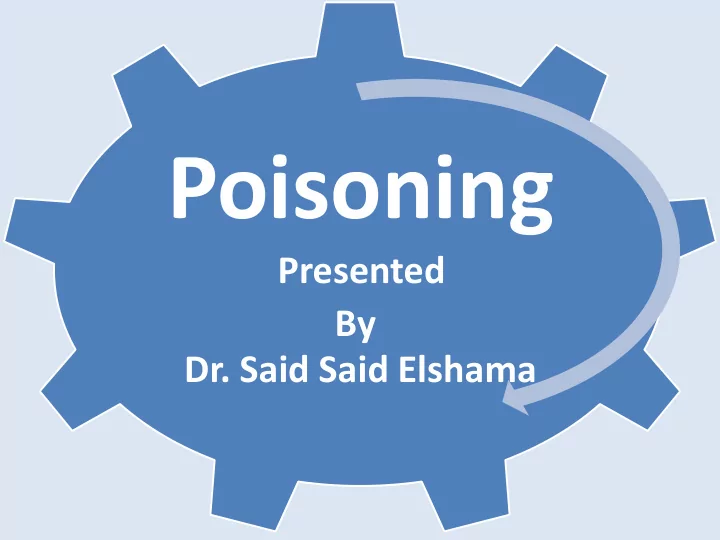

Poisoning Presented By Dr. Said Said Elshama
Definition :- Poison is anything that kills or injures through its chemical actions. Routes of intoxications :- 1-Ingestion (oral ) (Solids, Liquids) 2-Inhalation ( breathing ) (Sprays ,vapors) 3-Dermal (the skin) 4-IV (injection )
Types of Toxins 1- Chemicals (household cleaning products ). 2- Foods • Some mushrooms are poisonous • Drinking water contaminated by agricultural or industrial chemicals 3- Drugs • Drugs in excess (overdose ). • Vitamins, especially A and D, if taken in large amounts can cause death.
Poisoning Symptoms • The signs and symptoms seen in poisoning are so wide and variable that there is no easy way to classify them. • Some poisons enlarge the pupils, while others shrink them. • Some result in excessive drooling, while others dry the mouth and skin. • Some speed the heart, while others slow the heart. • Some increase the breathing rate, while others slow it.
Toxidromes Consist of groups of signs and symptoms found together with a given type of poisoning. Anticholinergic toxidrome: . Rapid heart rate, . large pupils, dry hot skin, . Retention of urine, mental confusion, hallucinations and coma.
• When the illness may be poisoning or may not be poisoning • Some signs and symptoms of poisoning can imitate signs and symptoms of common illnesses. • For example, nausea and vomiting can also be found in many illnesses that have nothing to do with poisoning.
Diagnosis 1 - History -The name and The amount of the product -The time that the poisoning occurred , -The age and weight of the person who was poisoned 2-Physical examination 3-laboratory studies - reveal the cause of most poisonings. - toxicology screens in the blood or urine - the tests ordered will be based on the history and physical exam.
First Aid 1- Unconscious patient ABC Airway Breathing Circulation A- NON gastric decontamination Remove clothes + washing the body for 30/m B- Gastric decontamination Gastric lavage Activated charcoal cathartic C- Elimination Forced diuresis - Haemodialysis D- Antidote
First Aid 2-Conscious patient A- NON gastric decontamination Remove clothes + washing the body for 30/m B- Gastric decontamination Emesis ( mechanical or medical “ ipecac”) Gastric lavage Activated charcoal cathartic Whole bowel irrigation C- Elimination Forced diuresis - Haemodialysis D- Antidote
Contraindications • Emesis ( ipecac ) • Gastric lavage • Charcoal • Whole bowel irrigation • Forced diuresis
Thank You
Recommend
More recommend